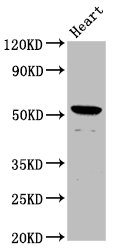NKD1 Antibody
-
货号:CSB-PA853369LA01HU
-
规格:¥440
-
促销:
-
图片:
-
Western Blot
Positive WB detected in: Rat heart tissue
All lanes: NKD1 antibody at 1.8μg/ml
Secondary
Goat polyclonal to rabbit IgG at 1/50000 dilution
Predicted band size: 53 kDa
Observed band size: 53 kDa -
Immunofluorescence staining of HepG2 cells with CSB-PA853369LA01HU at 1:200, counter-stained with DAPI. The cells were fixed in 4% formaldehyde, permeabilized using 0.2% Triton X-100 and blocked in 10% normal Goat Serum. The cells were then incubated with the antibody overnight at 4°C. The secondary antibody was Alexa Fluor 488-congugated AffiniPure Goat Anti-Rabbit IgG(H+L).
-
-
其他:
产品详情
-
产品名称:Rabbit anti-Homo sapiens (Human) NKD1 Polyclonal antibody
-
Uniprot No.:Q969G9
-
基因名:
-
别名:NKD1 antibody; NKD antibody; PP7246 antibody; Protein naked cuticle homolog 1 antibody; Naked-1 antibody; hNkd antibody; hNkd1 antibody
-
宿主:Rabbit
-
反应种属:Human, Rat
-
免疫原:Recombinant Human Protein naked cuticle homolog 1 protein (269-384AA)
-
免疫原种属:Homo sapiens (Human)
-
标记方式:Non-conjugated
本页面中的产品,NKD1 Antibody (CSB-PA853369LA01HU),的标记方式是Non-conjugated。对于NKD1 Antibody,我们还提供其他标记。见下表:
-
克隆类型:Polyclonal
-
抗体亚型:IgG
-
纯化方式:>95%, Protein G purified
-
浓度:It differs from different batches. Please contact us to confirm it.
-
保存缓冲液:Preservative: 0.03% Proclin 300
Constituents: 50% Glycerol, 0.01M PBS, pH 7.4 -
产品提供形式:Liquid
-
应用范围:ELISA, WB, IF
-
推荐稀释比:
Application Recommended Dilution WB 1:500-1:5000 IF 1:50-1:200 -
Protocols:
-
储存条件:Upon receipt, store at -20°C or -80°C. Avoid repeated freeze.
-
货期:Basically, we can dispatch the products out in 1-3 working days after receiving your orders. Delivery time maybe differs from different purchasing way or location, please kindly consult your local distributors for specific delivery time.
相关产品
靶点详情
-
功能:Cell autonomous antagonist of the canonical Wnt signaling pathway. May activate a second Wnt signaling pathway that controls planar cell polarity.
-
基因功能参考文献:
- the downregulation of NKD1 may be involved in the proliferation and migration of osteosarcoma cells through the activation of the canonical Wnt signaling pathway. PMID: 29115501
- The NKD1/Rac1 feedback loop regulates the invasion and migration ability of hepatocellular carcinoma cells. PMID: 27231134
- HNF1A-AS1 promoted HCC cell proliferation by repressing the NKD1 and p21 expression. PMID: 28292020
- Data indicate that microRNA miR-744 activated Wnt/beta-catenin pathway by targeting multiple negative regulators of Wnt/beta-catenin signaling, including SFRP1, GSK3beta, TLE3 and NKD1, and that NKD1 is a major functional target of miR-744. PMID: 28107193
- NKD1 showed significantly increased level after induction chemotherapy achieved complete remission in follow-up paired acute myeloid leukemia patients ( p < 0.001). These findings indicated that reduced NKD1 expression is associated with unfavorable clinical outcome in cytogenetically normal acute myeloid leukemia. PMID: 28443469
- Low NKD1 expression is associated with hepatocellular carcinoma. PMID: 27507614
- Silencing of NKD1 significantly inhibited the proliferation and invasion of osteosarcoma cells. PMID: 28032380
- Suggest that NKD1 plays an important role in invasion in human breast cancer and it appears to be a potential prognostic marker for patients with breast cancer. PMID: 26097589
- Reduced NKD1 protein expression correlates with a poor prognosis in NSCLC PMID: 21599923
- Mutations in the human naked cuticle homolog NKD1 found in colorectal cancer alter Wnt/Dvl/beta-catenin signaling PMID: 19956716
显示更多
收起更多
-
亚细胞定位:Cell membrane. Cytoplasm.
-
蛋白家族:NKD family
-
组织特异性:Expressed in colon, heart, kidney, leukocyte, liver, lung, ovary, pancreas, placenta, prostate, skeletal muscle, small intestine and spleen.
-
数据库链接:
HGNC: 17045
OMIM: 607851
KEGG: hsa:85407
STRING: 9606.ENSP00000268459
UniGene: Hs.187578
Most popular with customers
-
-
YWHAB Recombinant Monoclonal Antibody
Applications: ELISA, WB, IF, FC
Species Reactivity: Human, Mouse, Rat
-
Phospho-YAP1 (S127) Recombinant Monoclonal Antibody
Applications: ELISA, WB, IHC
Species Reactivity: Human
-
-
-
-
-























